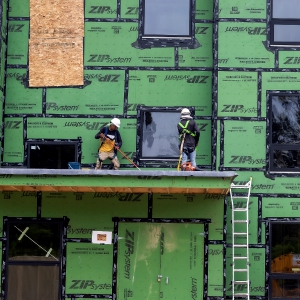As NH lawmakers eye statewide housing solutions, local control remains a barrier

Concord NH State House
| Published: 03-13-2024 10:11 AM |
The goal behind the bill is bold: Allow any property owner to build residential housing units in a commercial zone – whether the zone allows for it already or not.
Proponents of the legislation, House Bill 1053, argue it is a way to fast-track the creation of “mixed-use” housing in New Hampshire, allowing developers to increase the number of housing units in the state by opening new areas.
“We need to loosen zoning restrictions to make it easier to build new housing or to allow people to occupy existing structures,” said Rep. Eric Gallagher, a Concord Democrat, speaking to his fellow members of the House Municipal and County Affairs Committee Monday. “If you’ve got a business leaving, fine. That’s just more room for housing. We need housing more than we need businesses right now.”
But critics rooted their opposition in a handful of words that would give property owners much more power over cities and towns: “as a matter of right.”
“Any time I see a bill that says ‘as a matter of right,’ that compels top-down zoning, I’m against,” said Rep. Len Turcotte, an Allenstown Republican and chairman of the committee. “It’s just something I’m not willing to do.”
The exchange underscored a tension at the heart of New Hampshire’s push for more housing: How much should towns and cities get a say?
This year, a number of bills would override certain town and city zoning codes, with an aim to expand housing construction by skirting local barriers. Housing advocates say that approach is the only one to address what has become an entrenched problem. Others see a move to undermine local control. And they argue that any growth in housing in New Hampshire should happen with town officials’ direct approval.
HB 1053 will likely not survive: Last week, the committee recommended, 15-2, the bill be killed, and the full House will take up that vote in the next few weeks. But there are other bills that attempt to give homeowners and developers similar rights.
Article continues after...
Yesterday's Most Read Articles
 New Hampshire legalizes public alcohol consumption in designated ‘social districts’
New Hampshire legalizes public alcohol consumption in designated ‘social districts’
 New Hampshire providers brace for Medicaid changes that reach beyond healthcare
New Hampshire providers brace for Medicaid changes that reach beyond healthcare
 Warner town administrator granted restraining order against selectman
Warner town administrator granted restraining order against selectman
 Hotel makeover underway in downtown Concord
Hotel makeover underway in downtown Concord
 Opinion: Dear Gov. Ayotte, let’s talk about the books
Opinion: Dear Gov. Ayotte, let’s talk about the books
 State rules Epsom must pay open-enrollment tuition to other school districts, despite its refraining from the program
State rules Epsom must pay open-enrollment tuition to other school districts, despite its refraining from the program
House Bill 1400 would prohibit city and town zoning and planning committees from requiring more than one parking space per unit. Some towns require higher numbers, which advocates say can discourage development.
House Bill 1361 would require municipalities to provide “reasonable and realistic” opportunities for new manufactured housing parks and would block zoning codes that effectively bar housing parks in those towns.
Lawmakers are also entertaining House Bill 1281, which would prevent cities and towns from requiring that tenants be family members in order to live together. The bill would block any ordinance that prohibits unmarried cohabitants, such as roommates, and would strike down any zoning code that restricts rental occupants to one per bedroom.
And the House is considering a bill that would expand the number of accessory dwelling units that property owners would be allowed to build by right. That bill, House Bill 1291, is considered by some housing advocates as the best chance for broad zoning reform this year, but some have opposed it as unwarranted state intrusion.
To those looking to spur housing development, the bills address what has been seen by advocates and researchers as a key problem in New Hampshire: tight local zoning codes that prevent the homes that are necessary to meet the state’s high demand. The state’s rental vacancy rate has hovered below 1 percent for years – far below the 5 percent target set by housing researchers. And new homes for sale are scarce and expensive, with the median house still priced at $475,000, according to the New Hampshire Association of Realtors.
“By allowing homeowners to build either an attached or detached ADU on their property, and removing burdensome regulations, we can diversify our housing supply with more affordable housing options tailored to individuals at different stages of life,” testified Matthew Mooshian, advocacy and engagement director for 603 Forward, a progressive advocacy group.
Still, some local planning officials have pushed back. In testimony, Timothy Harned, the former chairman of the North Hampton Planning Board, argued that allowing additional ADUs “by right” could lead to overcrowding and a burden on municipal septic systems.
Glenn Horner, chairman of the Epsom Zoning Board of Adjustment, agreed.
“The proposed allowance for two ADUs per lot would then triple the number of potential residences in town, and with the inclusion of incentives for workforce housing, creates a scenario of overwhelming the town’s ability to assimilate these new residents and their needs,” he argued.
The New Hampshire Municipal Association, which represents town and city select boards, also opposes the top-down approach. In testimony to the House, Natch Greyes, the association’s government affairs counsel, called it an “unnecessary intrusion on local control.”
In an interview, Greyes argued that some cities and towns are already taking advantage of the existing environment to change their zoning codes to allow more housing. Keene, Enfield, Manchester, and Newmarket have all taken steps recently to increase the number of accessory dwelling units, Greyes noted.
“All of these large developments have really gone in a very similar path where they have really innovative proposals, and they usually don’t fit entirely within local zoning, but they get buy-in from the community,” he said.
Lawmakers are also advancing bills that would give towns more tools to expand workforce housing in their zoning codes – a strategy that empowers them, rather than overrides them. Senate Bill 538, known as the “HOMEnibus,” includes a number of those tools, including new tax incentives towns could choose to offer developers to convert commercial space to residential space, and the creation of “inclusionary zoning districts” that towns could deploy to mandate affordable housing construction.
But advocates say the state’s deficit of units is simply too large to be solved by towns alone.
“I don’t think it’s going to be enough,” said Elissa Margolin, director of Housing Action NH, a coalition advocacy group. “We need a variety of tools. This is a very severe crisis.”
“If we only do a town-by-town approach, we’re going to end up with a really uneven landscape,” Margolin added. “So it’s OK to make sure that we’re putting policy out there that provides different kinds of tools.”







 New Hampshire school phone ban could be among strictest in the country
New Hampshire school phone ban could be among strictest in the country Concord became a Housing Champion. Now, state lawmakers could eliminate the funding.
Concord became a Housing Champion. Now, state lawmakers could eliminate the funding. ‘A wild accusation’: House votes to nix Child Advocate after Rep. suggests legislative interference
‘A wild accusation’: House votes to nix Child Advocate after Rep. suggests legislative interference  Sununu decides he won’t run for Senate despite praise from Trump
Sununu decides he won’t run for Senate despite praise from Trump
